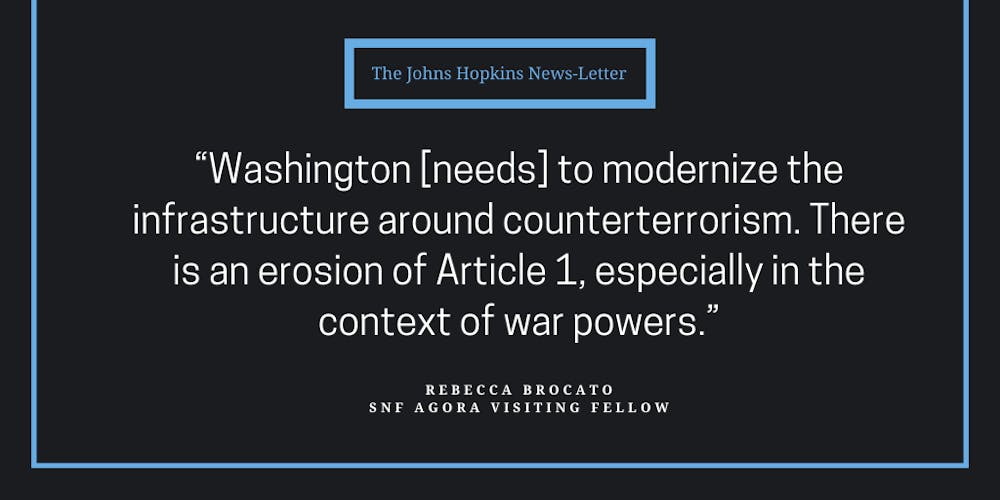The Stavros Niarchos Foundation (SNF) Agora Institute and the International Studies Leadership Council (ISLC) co-hosted “The Politics of War Powers” on Oct. 24. The panel discussion featured Visiting Fellow Rebecca Brocato and author Tess Bridgeman. The speakers discussed the use of Article 1 of the Constitution and the 2001 Authorization for Use of Military Force (AUMF) as legal basis for the War on Terror.
Bridgeman is Co-Editor-in-Chief for Just Security, a national security think tank and forum. During the Obama administration, she also served as Special Assistant to the President, Associate Counsel to the President and Deputy Legal Advisor to the National Security Council (NSC). Bridgeman recently wrote an article regarding why the “associated forces” clause should be kept out of any new iterations of the AUMF regarding the War on Terror. Her expertise is specific to international law on conflicts.
Brocato is the founder and principal at Stony Run Advisory, the former Chief of Staff at the Development Finance Corporation and the former U.S. NSC senior director for legislative affairs. Her recent work discusses what the U.S. should define as success regarding its foreign policy.
The panel began with a summary of the original intention of the 2001 AUMF. Going back to its creation, Bridgeman explained that the exact wording and passing of the document aimed to allow for swift action against Al-Qaeda in the wake of 9/11.
“[The AUMF] was a sweeping authorization passed very quickly in the aftermath of 9/11 and very, very overwhelmingly,” she said. “The lawyers advancing [the AUMF] at the time thought that it would have a narrow applicability … something that couldn’t be susceptible to abuse and wouldn’t expand in the future.”
Bridgeman pointed out that the AUMF was nevertheless expanded in a way that the 2001 legislators who passed it did not intend to. She cited the AUMF’s expansion as a result of the rise of the Islamic State of Iraq and Ash-Sham (ISIS) around 2014.
“[ISIS was] sweeping across Iraq and Syria committing horrific atrocities, unable to be stopped by the local governments in Iraq or Syria,” she said. “The Obama administration started doing some small operations largely humanitarian in nature but that didn't qualify as a use of force that they justified to Congress as on the President's Article Two authority alone.”
Bridgeman added that the American people do not know who they are at war with under the 2001 AUMF, as the current list of “associated forces” for purposes of the 2001 AUMF is classified.
Brocato also raised a similar point regarding the expansion of the 2001 AUMF. She argued that its usage following the Bush administration was unfounded because the United States’ decision to regard ISIS as a successor to Al-Qaeda, and therefore as subject to the AUMF, was erroneous. She argued that whilst the AUMF may have been necessary to expedite the US reaction to 9/11, a ‘rapid response’ mechanism is not as necessary for the present day.
Pointing out the executive branch’s misuse of the document as authorization for their counterterrorism operations against ISIS, Brocato commented on the fundamental difference between ISIS and Al-Qaeda.
“ISIS is not Al-Qaeda because it had said it was not Al-Qaeda. Its leadership had a fairly distinct falling out with the leadership of Al-Qaeda. This is an entity that is keeping telling people that it is not Al-Qaeda,” she said.
Moving forward, Brocato emphasized the United States’ need to improve its foreign policy framework regarding conflicts.
“Washington [needs] to modernize the infrastructure around counterterrorism,” she said. “There is an erosion of Article 1, especially in the context of war powers.”
Specifically, Brocato highlighted the growing need to cut off counterterrorism policymaking from the old AUMF and either modernize or democratize this process by establishing congressional oversight.
However, Brocato expressed doubt regarding the feasibility of such changes. She described the AUMF as lacking any expiration date, meaning that it will remain the crux upon which the U.S. conducts counterterrorism operations and continue to erode Article 1 for as long as it stands.
“It is one of those things where, at least from my perspective, until a decision is made to basically cut off our ability to rely on the old AUMF to conduct these operations, it's really hard to see how this architecture can be modernized,” she said.
In an interview with The News-Letter, freshman Yvette Shu shared that attending the event made her more interested in the discussion topic and SNF Agora.
“I was really keen on seeing what [Dr. Brocato] is up to because of her practical experience in the White House,” she said. “I found the talk really invigorating and learned a lot about not only AUMF but the finer details of what is going on regarding U.S. policy in the Middle East.”
Yvette Shu is a member of the News & Features section at The News-Letter and did not contribute to the reporting, writing or editing of this article.





